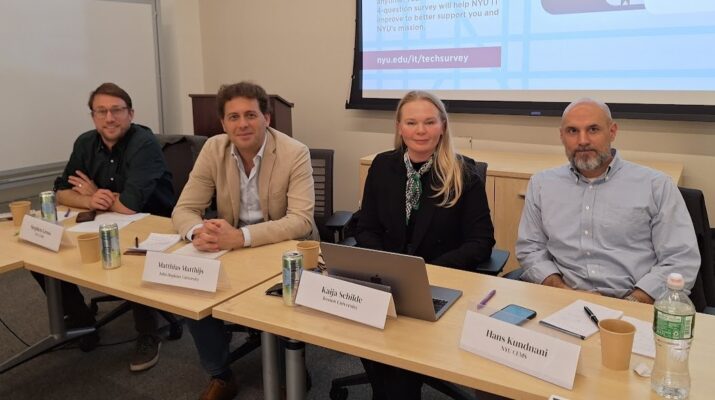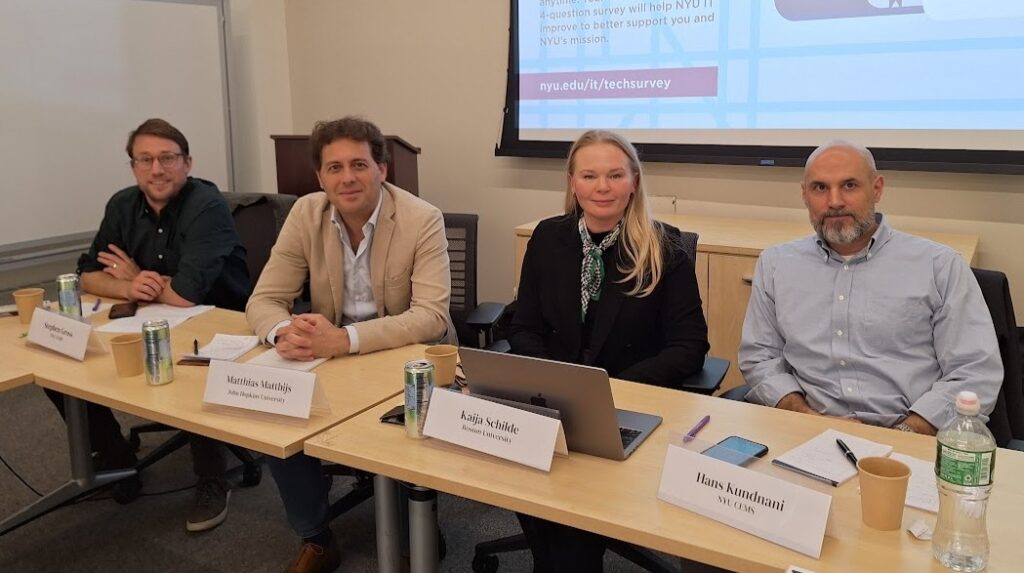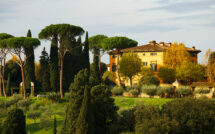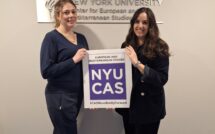

CEMS Programming
The Center for European and Mediterranean Studies (CEMS) annually hosts three lecture series led by members of the faculty. These series are a cornerstone of the Center’s faculty programming, central to fostering academic dialogue and intellectual exchange. For the fifth consecutive year, Professor Alexander C.T. Geppert’s “NYU Space Talks: History, Politics, Astroculture” highlights research on outer space in the humanities and social sciences. Meanwhile, the CEMS European Seminar Series, led by Professor Stephen Gross, focuses on the myriad challenges facing contemporary Europe, and Professor Larry Wolff’s Eastern Europe Workshop features interdisciplinary discussions surrounding the past, present, and future of the eponymous region.
In the five years the talks have been held, Professor Geppert has seen the number of attendees grow exponentially. The guest list is now at nearly a thousand individuals. The program’s most recent session saw over one hundred sign-ups from around the world; that number of attendees regularly connect at each session. The worldwide distribution reflects the global scope of the program. Professor Geppert has actively sought scholars doing “innovative and interesting” work in the humanities related to outer space and extra-terrestrial life irrespective of nationality or thematic focus. A quick glance at the ninth season illustrates the diversity of topics and approaches: historians speaking about the Chinese space program; the search for extra-terrestrial intelligence; the French Astronomical Society in the Belle Époque; and curators of three of the world’s leading museums of science and technology to discuss how space is displayed. While the historians presenting this year are all based at European institutions, Professor Geppert points out this was unintentional — previous years have seen North American, Latin American, and Asia-based speakers. He is actively looking for speakers from Africa to present, which would complete the global nature of the series. He hopes that even more students, both graduates and undergraduates, both from NYU and from other universities will continue attending the events and actively participate. The event series is not a series of book talks; it is about providing forums for discussion of new scholarship. Exposing students to cutting-edge research allows them to enhance their knowledge and feel more at home participating in the community created by this worldwide scholarly platform. For more information about NYU Space Talks, please visit here.
The European Seminar series is spearheaded by Professor Gross and is focused on contemporary Europe. Unlike the other programming, the European Seminar Series is a reflection of the whole of the CEMS department, as it is designed by Professor Gross in tandem with the CEMS faculty, who utilize their expertise to discuss European issues today. It attempts to “appeal to diverse interests” within the student body and its broader academic audience while retaining the common theme of interdisciplinary approaches to Europe. This has led to events covering topics like the 2024 French elections, the “myth” of a green Germany, and the future of European foreign and military policy in the face of both Russia and a withdrawing U.S. administration. Unique among the events is the inclusion of members of the diplomatic missions to the United States as speakers, and even a panel promoted by the German Consulate General New York. Because of the roundtable format of many of the events, Professor Gross hopes that students come away with a deeper appreciation for how “contested” current events and the recent past are amongst scholars. And he finds it important that CEMS “responds” to current events—an example being a roundtable added to the spring catalogue after the December 24 vote of no-confidence in the governing coalition led by Olaf Scholz in Germany. This imperative is balanced with events planned in advance that are designed to feature talks on areas of interest for the student body and faculty.
The final event series, Professor Larry Wolff’s Eastern Europe Workshop, is the longest running of the three. Unlike the other two series, the Eastern Europe Workshop is explicitly bounded; Eastern Europe is “delineate[d]”, but the relationship between Eastern Europe and other regions of Europe are discussed. While scheduled events occasionally do coincide with current affairs, others focus on trailblazing scholarship into Eastern Europe’s past. Professor Wolff explained that he hopes students attend and discuss “public issues” and “scholarship” and leave with a better understanding and appreciation for the region. Distinct from the other two series is the heavy emphasis on graduate student participation, not only as attendees, but also as presenters of their own work. This past fall, two PhD students presented their research and were treated as peers to visiting professors with published books. The aim is squarely at graduate students—while faculty and interested outside parties attend the events—graduate students are the focus. They are encouraged to develop their understanding of how their own work is linked to the region and to the work being presented. Unlike the other events, the Eastern Europe Workshop also functions as a class worth credits through NYU (though not all attendees, the author included, take those credits). The long-running event series has helped shape the growth of interest in Eastern Europe at NYU amongst graduate students, as well as in the broader academic community in New York City. It has, for example, helped prime students to respond positively to a “musical lecture” on Habsburg military bands, instead of puzzling over the significance of musical scholarship for European studies. The series has left its mark, creating a “community of scholars” within NYU and beyond, fueling the future of scholarship on Eastern Europe.
All three series foster critical engagement with cutting-edge scholarship, though they achieve that goal in distinct ways reflective of their hosts. Professor Geppert’s NYU Space Talks: History, Politics, Astroculture exposes students to a global scholarly community while still retaining a European character. The European Seminar Series organized by Professor Gross focuses on contemporary issues and highlights the diverse and contested perspectives on European affairs. Professor Wolff’s Eastern Europe Workshop invites students to a colloquium-like forum, where they are expected to lead and respond. Each event through these series offers opportunities to students and the scholarly community affiliated with NYU to engage on academic topics about Europe 一 part of the broader goal of CEMS.
Learn more about CEMS’ events here.
Author Bio
Kellen Sincoff is a Master of Arts in European and Mediterranean Studies candidate ’25.




